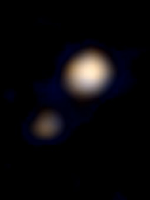 I’ve never been very interested in the question of whether Pluto is a planet or not. But the only clear distinction that I know of is whether an object has sufficient gravity to collapse into more or less a sphere. By this definition, Pluto would be a planet, and so would a number of other objects. But is that all a planet is? If there were a really big comet that orbited the sun every ten thousand years, would we really want to call that a planet? Isn’t a planet just the lose term we use for the “wandering stars” in the sky? Does this have to be a big deal?
I’ve never been very interested in the question of whether Pluto is a planet or not. But the only clear distinction that I know of is whether an object has sufficient gravity to collapse into more or less a sphere. By this definition, Pluto would be a planet, and so would a number of other objects. But is that all a planet is? If there were a really big comet that orbited the sun every ten thousand years, would we really want to call that a planet? Isn’t a planet just the lose term we use for the “wandering stars” in the sky? Does this have to be a big deal?
Tim DeBenedictis over at Space.com seems to think it is a big deal, Why Pluto Is a Planet, and Eris Is Too. He is unhappy about the 2006 IAU Resolution 5A that defined away Pluto’s planet status. And he’s not totally wrong. The resolution defines a planet as an object orbiting the sun that is large enough to be spherical and that has “cleared the neighborhood around its orbit.” DeBenedictis doesn’t even like — nor understand — the spherical requirement. But he’s right that the “cleared” aspect of the definition is vague.
But his alternative is just silly. He proposes that we simply define a planet as any object with a radius of 1,000 km orbiting the sun. This is convenient because it allows Pluto to slip in as a planet (Pluto has a radius of 1,200 km). It is arbitrary, but he rightly noted that all systems are arbitrary. But there is an obvious counter: not all definitions are equally arbitrary. Why not go with the “sphere” definition? I assume it is because DeBenedictis doesn’t want to allow Pluto in the family of planets at the cost of devaluing the title.
This is an attitude I see with a lot of people. Somehow, Pluto isn’t valuable if it isn’t a planet. But I would have thought that the Rosetta mission to Comet 67P/Churyumov–Gerasimenko would have dispelled this kind of thinking. All of the objects that we visit are ridiculously large. And they are all wondrously interesting. Call Pluto whatever you want, the New Horizons mission is so incredibly cool that I feel like a kid again — checking every day for news on it. And it is largely because Pluto is small and is strange that makes visiting it so exciting.
I would prefer to define planets the way that Potter Stewart defined obscenity, “I know it when I see it.” I think size is important. But I also think that orbit is important. Although I think Eris is kind of small to be considered a planet, I have a much bigger problem with its highly eccentric and absurdly inclined orbit. Pluto has the same problems, but to a lesser degree. And I doubt if we would even be having this conversation if Pluto hadn’t been so thoroughly sold to the public before we found out just how small it was.
It’s all kind of a mess. Pluto and Eris are very cool objects and they deserve their own categories. I’m tending to think that we call all the objects that are big enough to be spherical “planets.” Then we can subdivide them. Certainly there are fundamental differences between the solid inner planets and gas giant outer planets. So maybe we should have three categories: solid planets, gaseous planets, and weird planets. I really don’t care. But there are things that make Pluto distinctly different from Mercury, Venus, Earth, and Mars. But that’s not a bad thing; in fact, that’s a great thing.
What’s in a name? That which we call a rose
By any other name would smell as sweet…






Well I can’t offhand think of a way to insert Eris into the grade school mnemonic My Very Educated Mother Just Served Us Nine Pizza pies. It’s Italian food, so maybe eggplant. But that feels forced. I think that was actually a Schoolhouse Rock bit as well. The Saturday morning cartoons I watched as a kid had Schoolhouse Rock and In The News, which was a CBS produced honest to god short news segment for kids. And it had actual news, read by some gravelly voiced old man who might have been Dan Rather, telling nine year old me about Jimmy Carter and Menachem Begen. I can’t even get that on CNN today. Fairness doctrine. Thanks, Reagan.
But Pluto, I don’t really care, but I understand people wanting to hold on to their own romantic ideas about the past.
Yeah, I don’t care either. But the mnemonic works really well for 8 planets: My Very Educated Mother Just Served Us Naan. And regarding all the schoolhouse rock stuff: it was great. Better than CNN indeed.
Would the Earth or Mars or Mercury “clear their orbit” if moved to Pluto’s location? I gather the answer is NO. Would Pluto “clear” Mercury’s orbit if the two bodies changed places? I suspect the answer is YES. And duplicate the answers for Sedna and Eris and maybe even Ceres. So the purported definition for a Real Planet, as provided by (some) astronomers, seems a bit silly.
What I’d do, were I writing an astronomy text, is define a set of Classical Planets, 9 in number, from Mercury out to Pluto. The criteria for inclusion would be that up to Oct 4, 1957 those bodies were viewed as planets. I.e., they were round more or less, orbited the sun rather than each other, had a reasonable size, etc.
Let’s concede in advance this is a rather arbitrary definition. But it works well enough — certainly did up to 1957, anyhow! And for the students with serious interest, you can fill them in later on Eris and Dysnomia (or, as I prefer to think of them Xena and Gabrielle) and Makemake and Haumea and Sedna and whatever else we’ve found out there. The good students will remember that extra planetary bodies exist and have some notion of their nature; that strikes me as sufficient.
Later yet, of course, any discussion of “planets” must cover what we think we know about several thousand exoplanets, most of which seem to be leading very different lives from what earthly astronomers would expect.
Geez! I just managed to delete my whole longish response. Don’t worry, it only seems to happen with the administrative interface to comments.
Like I said: I don’t care. I do think that Pluto is more indicative of the Kuiper belt and is thus useful in getting people to think that. When I was a kid, we all thought there was really nothing much out there. Now it looks like there is stuff everywhere between the stars.
I would prefer to get rid of the word “plants” altogether, because they don’t mean much. Jupiter is far more like the sun than it is like the Earth. But in the end, I don’t care. I’m fine with a planet being “a gravitationally created spherical object orbiting a star.” Having said that, I’d stick with 8 major planets. The only reason Pluto was on the list as a planet when Sputnik was launch was because it had really good PR!
Hmmm, binary star components are round things orbiting (other) stars. I think your definition of planet should include that they are not emitting heat or light from fission or fusion. After that, how do you want to handle “rogue” planets, moving about unbound by a star’s gravity?
Ideally, I suppose, one should inform students that celestial bodies exist in a size-based continuum, from free electrons and dust particles at one end, to galactic superclusters at the other end, rather than insist on Platonic essentialism. But something tells me, it’d be a hard pitch to make.
It’s a mess. I don’t see the nuclear emisions as being an issue since pretty much all planets do it — although only Jupiter to a major degree. We only have a bias toward light because that’s what we see. Again: I don’t care. There are a lot of ways we could do this. We could say that planets are objects that directly orbit a star that are at least as big as our moon. Or maybe we should go with mass because, you know: neutron stars. In normal conversation, I will still refer to Pluto as a planet because, as you noted, it always has been so denoted. But I have bigger fish to fry. I’ve got a book here on the magnetic field of the earth that I need to read. The only reason I’m even discussing Pluto is because I’m so excited about the flyby. But if it turns out to be the orbiting monolith from 2001, I won’t call it a planet anymore!